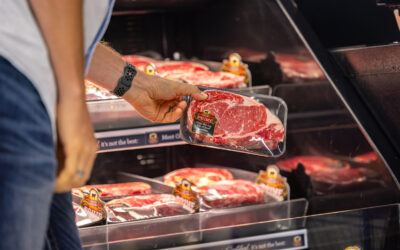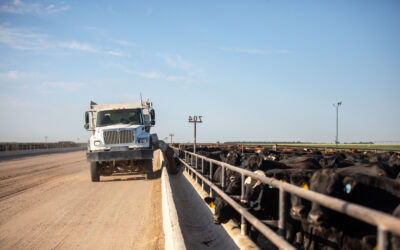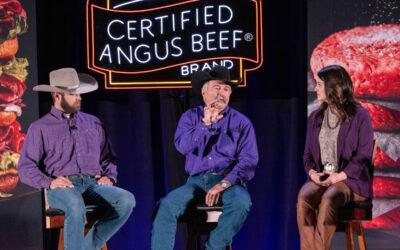
2023 Canadian Commitment to Excellence
Saskatchewan Angus Ranch Earns Certified Angus Beef Award
By: Lindsay Graber Runft, Director of Producer Communications
September 2023
The cattle business awards no trophies for participation. Nor does any rancher plan and work to be noticed for doing things right.
Yet caring for land and livestock quietly switched a spotlight on JPM Farms. Jean-Paul and Marlene Monvoisin, with their son Colton and daughter Josee Monvoisin-Garner, operate the quality-focused seedstock Angus ranch in the rolling hills near Parkbeg, Saskatchewan.
They lean into viable sustainability, with immense focus on the environment and a long-time partnership with Ducks Unlimited Canada. The perpetually progressive learners naturally work hard to improve their cow herd and grasslands.
“Our philosophy is to treat the land, the cattle and our family the best we can every day to make it a better day than the one before,” Marlene says. Outstanding results earned JPM Farms the Certified Angus Beef (CAB) 2023 Canadian Commitment to Excellence Award. The Monvoisin family was recognized at the CAB Annual Conference in Las Vegas, Nevada, in September.
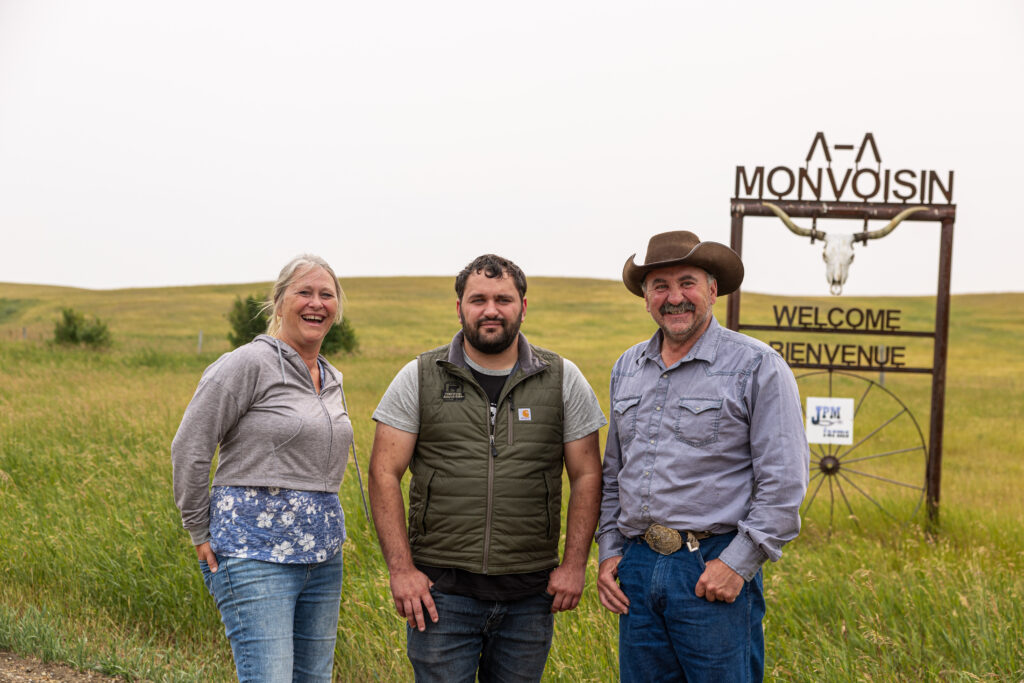
Caption: (left to right) Marlene, Colton & Jean Paul Monvoisin
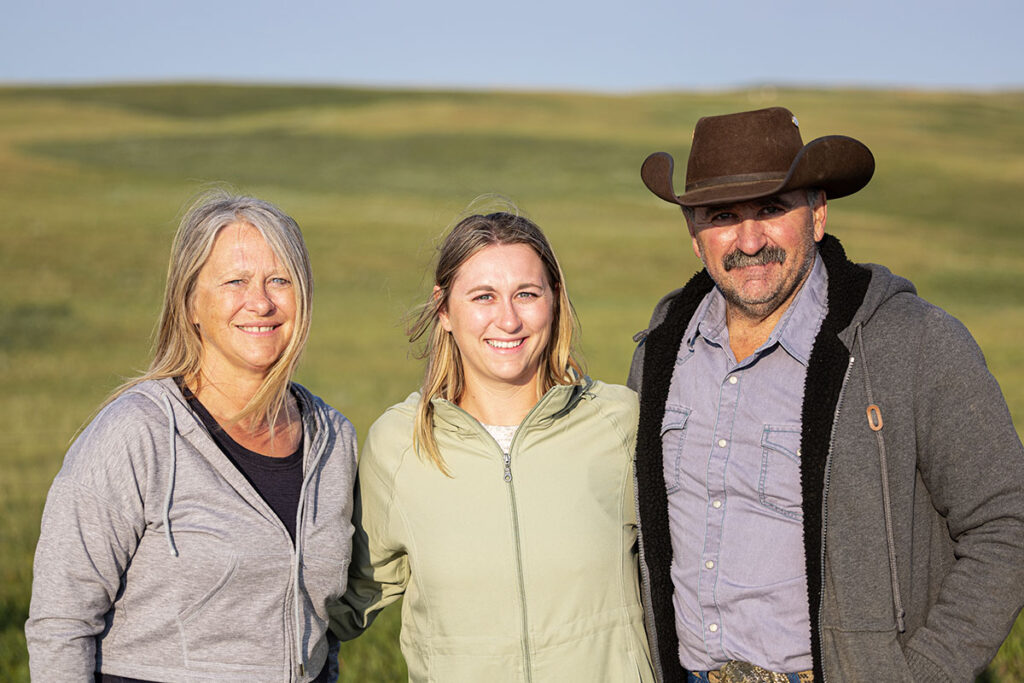
Caption: (left to right) Marlene and Jean Paul with Josee Monvoisin-Garner
Destination Ranchland
Just 100 miles north of the Montana border, JPM Farms sits in the heart of the Missouri Coteau, a hilly plateau that parallels the river southeastward into the Dakotas.
“When we’re green and wet here, we have a lot of pothole wetlands, and great upland vegetation that supports nesting habitat for waterfowl,” says Ross MacDonald of Ducks Unlimited. “That’s also what allows ranchers in this area to thrive.”
The ecosystem here depends on wildlife. The Monvoisins credit waterfowl, other birds and deer with helping increase sustainability in their native grassland pastures.
“Ensuring that you have a resilient, highly functioning soil provides biodiversity across the landscape—and distribution of landscape dynamics needed for different wildlife species and cattle grazing resources,” MacDonald says.
Partnering with Ducks Unlimited helps improve JPM Farms’ grasslands for environmental and ranching wins.
Conservation and Cows
Cattle are good for the grass. “I don’t think there’s another animal that could be as efficient in maintaining the landscape,” Jean Paul says.
Management underpins the effect, as JPM Farms strictly limits grazing for sustainability.
The arid to semi-arid Coteau’s native grasses tolerate some drought, but all pastures run the risk of sudden declines in grass and water quality.
That’s why the family worked with the Farm and Ranch Water Infrastructure Program on a pipeline that carries water to remote pastures on conservation easements. The result helps distribute grazing and gives purpose to land otherwise unusable for ranching.
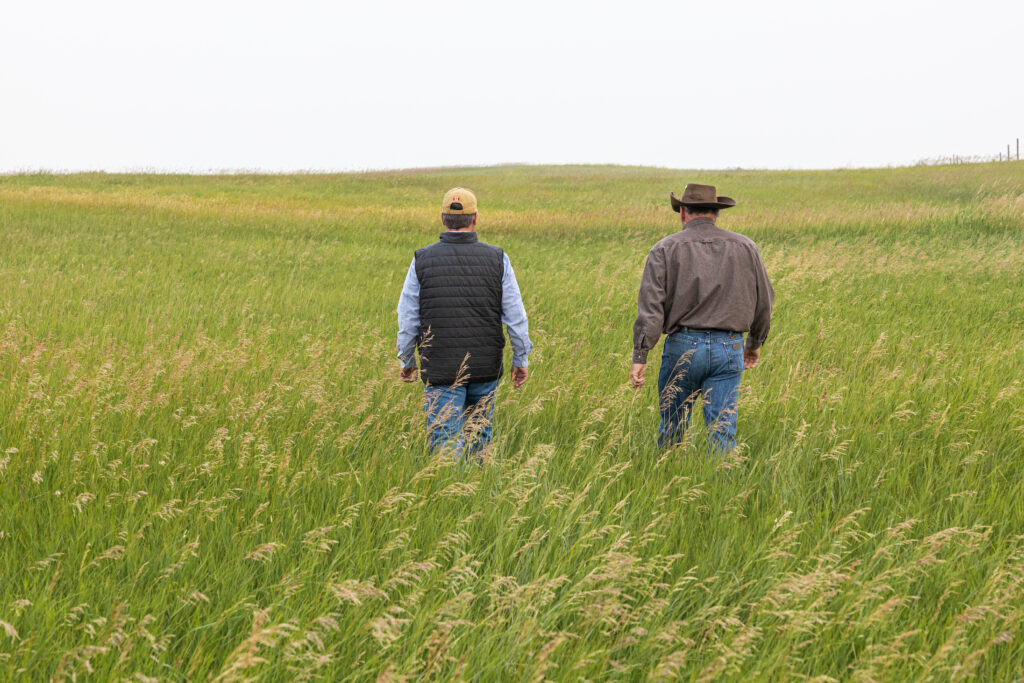
Caption: Jean Paul walking with Ross MacDonald.
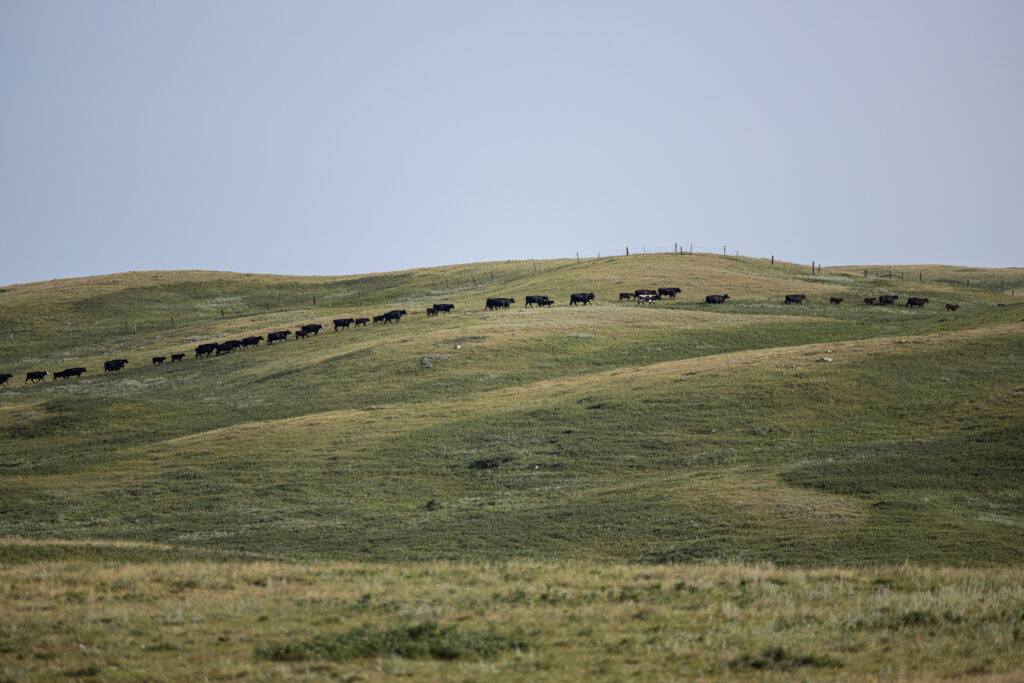
Feet, Function and Selection
Their cow herd has adapted greatly to the big hills and rocky setting since Jean-Paul’s grandfather brought registered black Angus to Saskatchewan in 1941. Cattle must walk across large summer pastures where structural correctness determines survival.
“You have to have good feet,” Jean-Paul says. “That’s the most important thing I’ve found.”
The wide-open country says a cow must be maternal, Marlene adds, providing steady care and raising a quality calf.
“The mother cow is the biggest way you’re going to be profitable,” she says.
They rely on such cows to produce bulls for customers, as well as calves with superior carcasses for beef the Monvoisins market independently.
“The biggest compliment I can get is to see my customers’ calf weaning weights go up a year or two after they start using our bulls,” Marlene says.
She says the best way to improve a herd and profitability is to cull from the bottom and build the top end. They are doing it in their own herd using expected progeny differences (EPDs), and helping customers do likewise. With better bulls come higher weaning weights and greater carcass quality, all adding dollars.
“It’s a huge part of sustainability,” Jean-Paul says. “We have to get paid for what we’re doing.”
Incorporating embryo transfer and a robust data collection system, the Monvoisins are geared toward progress. They are also committed to education, both in explaining EPDs to customers and learning for themselves.
The Goal, Not the End
The family’s recipe comes down to careful consideration of Angus genetics, continuing education and serving customers as bull buyers or helping to market calves.
“I feel ownership in the Certified Angus Beef brand,” Marlene says. “There’s immense pride in having Angus cattle in our herd and producing Angus for our customers, ourselves and the consumer.”
But excellence?
“I don’t think anybody can ever say they’re the best at anything. Excellence is a goal, not the end,” Marlene says. “It’s all the extra work you do to be successful or just make your own operation better.”
At JPM Farms, it means approaching each day with the attitude that you will make things better than they were yesterday— for your cattle, the land and how you treat other people. Going the extra mile and working hard at what you love.
You may also like
CAB Sets Sales Records, Sees Historically High Brand Acceptance Rates
In an otherwise tough time in the beef business, sales and supply records have been a bright spot. The positive numbers mean that quality beef production has not let up, and beef demand is holding. Consumers have proven the value proposition: the good stuff is worth a little more money, for a better eating experience.
Feeding Quality Forum Dates Set Earlier in August
When you’re feeding cattle, it counts to keep track of every calf, pound and dollar. Beyond the event’s educational sessions, networking between segments of the beef supply chain is invaluable—from feeders and cow-calf operators to allied industry and university researchers.
Gardiners Highlight Service, Strength at Foodservice Leaders Summit
Mark Gardiner and his son, Cole, of Gardiner Angus Ranch offered a boots-on-the-ground perspective for CAB specialists attending the annual event, designed to deliver resources that help train foodservice teams and serve consumers at a higher level.

